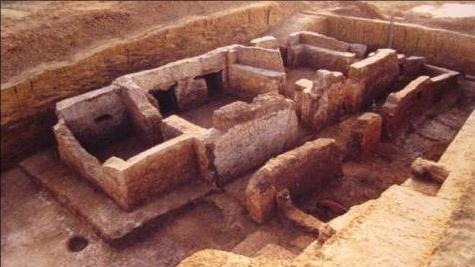Abstract
Introduction
The last fifty years or so have witnessed the discovery, excavation, and/or recovery of, numerous pre-Qin, Qin, and Han texts and documents. The subsequent publication of this material has resulted not only in the challenging of historical assumptions that had been accepted since antiquity but also in the necessity to rewrite and reconceive the history of the development of Chinese society and the creation of the imperial state under the Qin and Han dynasties. This short essay examines one lesser-known discovery that was made in the 1980s in what was initially designated Tomb No. 136 Zhangjiashan, and later renumbered as Tomb No. 336. The essay was written in honor of the late Professor Nanxiu Qian, whose remarkable scholarship challenged many long-held assumptions and beliefs in Chinese cultural, literary, and philosophical studies from the Six Dynasties to the late Qing and early Republican periods.[1]
The entire Zhangjiashan cemetery is located close to the ancient Qin city of Nan that replaced the Chu capital Ying when Qin conquered it in 278 BCE. Ying and Nan lie just north of present-day Jingzhou, Hubei Province, and west of the old walled town. The journal Wenwu 文物 published a preliminary excavation report on three Han tombs in 1985 and a further report on two tombs from the Zhangjiashan cemetery, probably both belonging to scribes who served in local and regional administrative offices, in 1992.
Of the two tombs, considerably greater attention has been paid to Tomb No. 247 (initially numbered No. 127) and its contents. For instance, Professor Anthony J. Barbieri-Low and I collaborated in translating and analyzing the important legal texts contained therein.[2] However, as of the date of writing (early 2024), a complete report on the clearing and excavation of the entire Zhangjiashan cemetery, an endeavor that started in the 1950s, has yet to be published.
[1] This paper does not engage with another aspect of Professor Qian’s interests—gender. For my most recent bibliography, which includes her publications, see Robin D.S. Yates and Danni Cai, “Bibliography of Studies on Women and Gender in China 2018-2022,” Nan Nü: Men, Women and Gender in China 25.2 (2023): 213-344.
[2] Anthony J. Barbieri-Low and Robin D.S. Yates, Law, State, and Society in Early Imperial China: A Study with Critical Edition and Translation of the Legal Texts from Zhangjiashan Tomb no. 247, 2 vols. Sinica Leidensia vol. 126 (Leiden: Brill Academic Publishers, 2015).

This work is licensed under a Creative Commons Attribution-NonCommercial-NoDerivatives 4.0 International License.
Copyright (c) 2024 Transnational Asia

